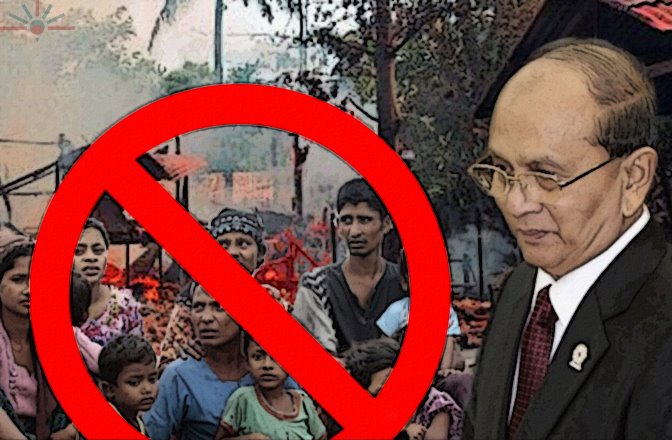
Non-recognition of Rohingya community from Myanmar government. Artwork by AK Rockefeller
Thousands of Rohingya boat refugees from Myanmar have sought asylum in nearby countries in Southeast Asia but those countries have all told them to seek help elsewhere.
The Myanmar government has refused to recognize the Rohingya as an ethnic group and treats them as illegal immigrants. Most Rohingyas are Muslims living near the borders of Myanmar and Bangladesh.
Escaping persecution by the military-dominated government, many Rohingyas have crossed borders to seek shelter and work in Thailand, Indonesia, and Malaysia. Some have been victimized by human trafficking groups.
Prior to the current ‘boat crisis’, a mass grave was discovered in Thailand which is suspected to be a ‘death camp’ for Rohingya illegal settlers in the country. More than 30 dead bodies were retrieved from the jungle grave early this month, which the UN Refugee Agency (UNHCR) has blamed on ruthless smugglers.
Last week, there were reports that boats carrying Rohingya refugees were apprehended by coastal patrols of Thailand, Indonesia, and Malaysia. But instead of rescuing the refugees, the coastal authorities ordered the boats back to sea.
In Thailand, a helicopter dropped supplies into the sea instead of delivering them directly to the refugees. Later, the boat carrying about 300 Rohingya was turned away. Major General Sansern Kaewkamnerd, a spokesman of the military-backed government of Thailand, said the boat was sent back to the sea after its engine was fixed and after water and food were given to the refugees.
He defended the government's decision to reject the refugees:
Under Thai law, all illegal migrants must be repatriated or sent to a third country. They cannot settle here. We've done our best based on humanitarian principles. If we are to be criticised for this, we'd like to ask our critics to ask themselves what they would do if this happened in their own countries.
Meanwhile, the government of Malaysia has denied that it failed to provide humanitarian aid to the Rohingya despite its poor record of providing protection to refugees.
Mr. Wan Junaidi Tuanku Jaafar, who is the Deputy Home Minister, said authorities have treated the Rohingya humanely despite their illegal entry in Malaysia. He added that the refugees and migrants should not be entering the country:
We have to send the right message, that they are not welcome here.
Nearby Indonesia has admitted to pushing back a refugee-packed boat earlier this month and re-directing it towards Malaysia, according to Human Rights Watch.
Phil Robertson, deputy Asia director of Human Rights Watch, criticized Myanmar for the persecution of the ostracized Rohingya and deplored the governments of Thailand, Indonesia, and Malaysia for refusing to give assistance to the boat refugees:
Thailand, Malaysia, and Indonesia have made things much worse with cold-hearted policies to push back this new wave of ‘boat people’ that puts thousands of lives at risk.
The UNHCR has expressed similar concerns. Volker Türk, the organisation's Assistant High Commissioner for Protection, explains that sea crossings are a symptom of desperation as people are left with no other choice but to risk their lives:
The first priority is to save lives. Instead of competing to avoid responsibility, it is key for States to share the responsibility to disembark these people immediately.
Charles Santiago, who is a Member of Parliament in Malaysia, condemned the Association of Southeast Asian Nations in a Facebook statement for its failure to take collective action to address the issue:
ASEAN is already lagging behind- the heads of states should have ironed out the thorny issue of the mass exodus of the Rohingya, which escalated further in June 2012 following state-sponsored violence, at the recently-concluded ASEAN summit. They failed to discuss about this crucial issue as it would entail looking at Burma's gross human rights violations against the Rohingya.
On Facebook, a pro-Rohingya group lashed out against the “racial prejudice” of Malaysian officials:
Racial prejudice plays a part in Malaysia's decision to not allow marginalized Rohingya refugees into the country for protection, food, water and sanctuary. Maybe some aspects of our society prefer that Rohingya return to Bangladesh and Myanmar to face the genocide, persecution.
Many Twitter users from around the world shared the same sentiment about the unjust victimization of the Rohingya:
#Rohingya is a world problem. The world must be solve this problem together and they can land at any country.
— Liberal Democracy (@ThaiFarmer_Son) May 15, 2015
To those tt say not refugees,just want to go to Malaysia,look at these children begging for food #Rohingya pic.twitter.com/dKKvGrxkLd — Adrian Ng (@AdrianNCF) May 15, 2015
Some are angry that regional leaders are not confronting the government of Myanmar:
Every gov saying #Rohingya not our problem, can't let them in there's thousands more where they came from. But no one confronts #Burma gov.
— Jamila Hanan (@JamilaHanan) May 14, 2015
Save #Rohingya by Weadee Patani #humantrafficking http://t.co/o9vab6nA7h pic.twitter.com/0MX0oKOn9o — ♥ Moui ♥ (@moui) May 13, 2015
Action on #Rohingya is a real test of character for #ASEAN. Are we compassionate or heartless nations? https://t.co/J9YsbtqgYB
— แก้วมาลา Kaewmala (@Thai_Talk) May 14, 2015
As public outrage spreads over neglect of the rights of the Rohingya minority, it is hoped the international community will urge regional leaders to confront the government of Myanmar and end the abuse suffered by the ‘forgotten’ citizens of Southeast Asia.







39 comments
A few thousand people is not even a large concert, yet no one can manage security for them? What is the use of traveling concert venues if they just suck up resources and move on down the road?